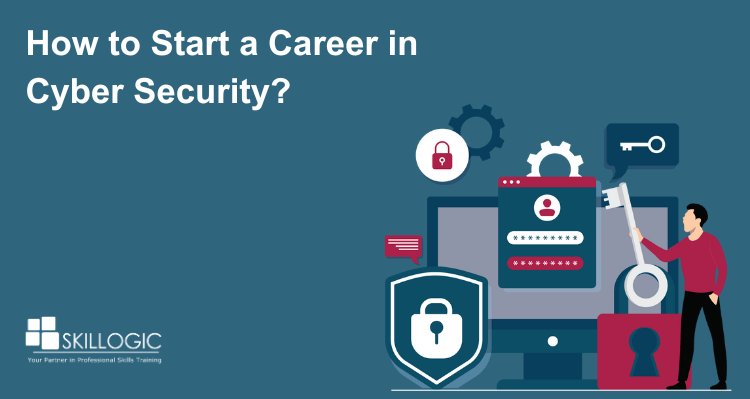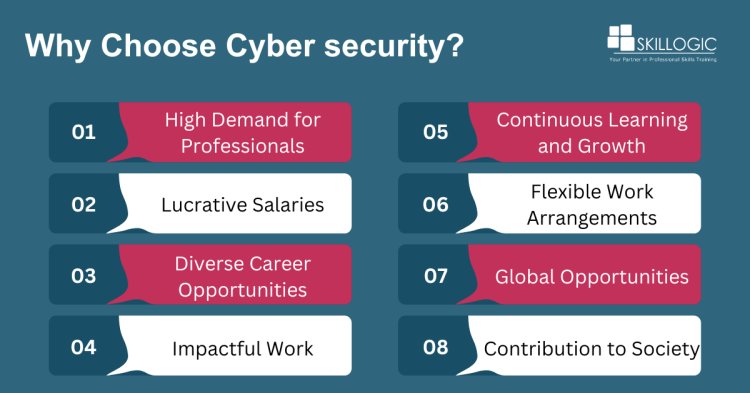How to Start a Career in Cyber Security?

Cyber security has become an essential field in today’s digitally driven world. Every day, businesses, governments, and individuals face the looming threat of cyberattacks, and the need for skilled professionals to protect sensitive data has never been greater. If you’re looking to break into the cyber security field, now is the perfect time to begin. This blog will guide you step by step through the process of starting a rewarding career in cyber security.
Understand the Basics of Cyber Security
The first step toward launching a career in cyber security is understanding its fundamental concepts.
Cyber Security is the practice of protecting computer systems and networks from theft, damage, or unauthorized access. Cyber security experts help to ensure the safety of digital information by identifying and mitigating various threats.
Some of the most common threats you’ll encounter include:
- Malware: Software designed to cause damage or disrupt systems.
- Phishing: Efforts to acquire confidential information through misleading emails or messages.
- Ransomware: Malware that blocks users from accessing their systems until a ransom is paid.
To get started, you should also familiarize yourself with basic cyber security concepts such as networking, cryptography, and risk management. These foundational skills are crucial as you begin your cyber security training.

Why Choose Cyber Security?
Cyber Security is rapidly becoming one of the most sought-after career paths, and for good reason. Here are several persuasive reasons to pursue a career in cyber security:
1. High Demand for Professionals
The digital age has brought about an unprecedented surge in cyber threats, resulting in a significant shortage of skilled Cyber Security professionals. According to various industry reports, millions of Cyber Security jobs remain unfilled, creating a robust job market with abundant opportunities for those entering the field.
2. Lucrative Salaries
With the growing demand for Cyber Security experts, competitive salaries are a major draw for this profession. Entry-level positions typically offer attractive salaries, which can increase significantly with experience and advanced certifications. Cyber Security professionals often enjoy salaries well above the national average.
3. Diverse Career Opportunities
Creates and develops secure network infrastructures.
- Security Analyst: Monitors systems for security breaches and responds to incidents.
- Penetration Tester (Ethical Hacker): Conducts simulated attacks to identify vulnerabilities.
- Security Architect: Creates and establishes secure network infrastructures.
- Compliance Analyst: Ensures organizations adhere to regulatory standards.
This variety enables people to select a path that matches their interests and abilities.
4. Impactful Work
Working in Cyber Security means playing a crucial role in protecting individuals, businesses, and governments from cyber threats. Your work plays a vital role in protecting sensitive information, avoiding financial losses, and maintaining the integrity of essential systems. This sense of responsibility can be deeply rewarding.
5. Continuous Learning and Growth
Cyber Security is a constantly evolving field, with new technologies, threats, and regulations emerging regularly. Professionals must stay current with industry trends, which fosters a culture of continuous learning. This dynamic environment provides opportunities for personal and professional growth, making each day unique and challenging.
6. Flexible Work Arrangements
Many Cyber Security roles offer flexibility in terms of work location and hours. With the rise of remote work, Cyber Security professionals can often work from home or choose flexible schedules that fit their lifestyles.
7. Global Opportunities
Cyber Security skills are in demand worldwide, providing professionals with opportunities to work in various countries and industries. Whether you prefer working for multinational corporations, government agencies, or startups, the skills you acquire in Cyber Security are transferable across borders.
8. Contribution to Society
As cyber threats become more prevalent, professionals in Cyber Security contribute to the overall safety and security of society. By protecting individuals and organizations from cybercrime, you play a vital role in creating a safer digital environment for everyone.
Refer these articles:
- Cyber security vs. Information Security: What’s the Difference?
- Top Cybersecurity Threats in 2024: What You Need to Know
- Top 7 Cybersecurity Certifications to Boost Your Career
Explore Different Career Paths in Cyber Security
The field of cyber security is vast, offering numerous career paths based on your interests and strengths.
- Security Analyst: As a security analyst, you will be responsible for monitoring systems, identifying threats, and implementing protective measures.
- Penetration Tester (Ethical Hacker): Ethical hackers use their skills to test systems for vulnerabilities, simulating real-world attacks to improve an organization’s defenses.
- Security Architect: This role focuses on designing secure infrastructures that minimize risk and prevent attacks.
- Incident Responder: When breaches occur, incident responders act quickly to mitigate damage and secure the compromised systems.
- Forensic Analyst: If you find investigating and analyzing cyber incidents engaging, a career as a forensic analyst could be the perfect fit for you.
- Compliance and Governance: This path involves ensuring organizations meet regulatory and industry standards regarding cyber security.
Each of these roles has unique responsibilities, so it’s essential to explore which aligns best with your strengths and career goals.
Building a Strong Cyber security Career Foundation
A solid educational background can set you on the right path to a successful cyber security career.
- Formal Degrees: Many cyber security professionals begin with degrees in Computer Science, Information Technology, or specialized Cyber Security programs. These degrees provide a broad understanding of the technical skills needed.
- Self-Study Resources: For those looking for a more flexible approach, online tutorials, YouTube channels, and cyber security blogs offer self-paced learning options.
- Bootcamps and Short Courses: Intensive programs such as cyber security bootcamps offer hands-on, practical learning. These top cyber security courses can often be completed in a few months and provide immediate skills for the job market.
No matter your educational path, continuously learning and honing your skills is critical to staying competitive.
Importance of Cyber security Certifications for Career Advancement
Certifications are a powerful tool for showcasing your expertise and dedication in the cyber security industry. Many employers prioritize certified professionals.
Some of the most recognized certifications include:
- EC-Council: Certified Ethical Hacker (C|EH): Focuses on ethical hacking techniques and testing systems for vulnerabilities.
- NASSCOM: Certified Cyber security Analyst (CCA): Covers a broad range of cyber security skills, ideal for entry-level professionals.
- IIFIS: AI Cyber Security Associate: Specializes in using artificial intelligence to enhance security measures.
- CompTIA Security+: A vendor-neutral certification covering essential cyber security knowledge, including risk management and network security.
Certifications not only validate your skills but can also significantly improve your earning potential and open doors to more advanced positions.
Gaining Practical Experience in Cyber security
Hands-on experience is vital in cyber security, as theory alone won’t be enough to excel in the field.
Internships and Apprenticeships: Look for opportunities to work under experienced professionals. Internships give you a chance to see cyber security in action and build valuable industry connections.
Personal Projects: Creating a home lab is an excellent way to practice your skills. You can also participate in Capture-the-Flag (CTF) competitions to test your problem-solving abilities in real-time scenarios.
Volunteer Work: Many nonprofits and small businesses have cyber security needs. Volunteering to help secure their systems provides real-world experience and a strong addition to your portfolio.
Networking and Community Involvement in Cyber security
Networking is crucial in cyber security. Building connections with other professionals in the field can lead to job opportunities and mentorship.
- Join Cyber Security Communities: Groups like OWASP (Open Web Application Security Project) and ISACA offer opportunities to connect with like-minded individuals, exchange knowledge, and participate in local events.
- Attend Conferences: Events like Black Hat, DEF CON, and RSA are fantastic places to learn from experts, discover new tools, and stay updated with industry trends.
- Participate in Online Platforms: Forums such as Reddit, LinkedIn groups, and specialized cyber security platforms offer avenues for networking and professional growth.
Engaging with the cyber security community keeps you informed about industry developments and strengthens your professional network.
Building a Strong Cyber Security Portfolio
As a cyber security professional, having a well-rounded portfolio is essential for showcasing your skills and experience.
- Showcase Projects: Whether it’s a personal home lab, a certification, or a vulnerability you identified, include all relevant projects in your portfolio.
- Create a Blog or Personal Website: Sharing your cyber security knowledge via blog posts or tutorials demonstrates your expertise and willingness to contribute to the field.
- Open-Source Contributions: Working on or contributing to open-source projects is another excellent way to build credibility in the community.
Your portfolio is a living document, so be sure to keep it updated as you grow and take on new challenges.
Steps to Secure a Cyber Security Role
Once you have the necessary skills, experience, and portfolio, it’s time to start applying for cyber security roles.
- Tailor Your Resume: Customize your resume to highlight relevant cyber security experience, certifications, and skills.
- Prepare for Interviews: Research common cyber security interview questions and be ready to undergo technical assessments.
- Job Boards and Company Websites: Platforms like LinkedIn, Indeed, and cyber security-specific job boards are excellent places to find open positions. Be sure to check company websites directly for opportunities that may not be advertised elsewhere.
Persistence is key when applying for jobs, as the hiring process in cyber security can be competitive.
Successful Cyber security Careers: Learning and Growth Strategies
The cyber security field is ever-evolving, so continuous learning is vital to staying relevant.
- Stay Updated: Keep up with the latest cyber security news, vulnerabilities, and tools.
- Advanced Certifications: Once you’ve gained some experience, pursue more advanced certifications to move into higher-paying roles like Penetration Tester or Security Engineer.
- Exploring Career Growth: As you grow in your career, consider leadership positions like Chief Information Security Officer (CISO) or Security Engineer.
Starting a career in cyber security requires dedication, but with the right combination of education, practical experience, certifications, and networking, you can build a fulfilling career in this high-demand field. Stay proactive, keep learning, and always remain curious—success will follow!
Refer these articles:
- Why Cyber Security Course in India in 2024?
- Cyber Security Scope in India
- How to Become a Cyber Security Expert in India?
At SKILLOGIC Institute, we understand the increasing importance of cyber security in today's digital landscape. Our Cyber Security Professional Plus Course is expertly crafted to provide learners with the skills necessary to navigate the unique security challenges present in various environments. Accredited by renowned organizations such as IIFIS and NASSCOM FutureSkills, this program features comprehensive training that includes real-time projects and exclusive practice labs. This hands-on approach ensures that participants not only gain practical experience but also develop a profound understanding of how to safeguard systems against potential threats.
With a community of over 100,000 empowered learners, SKILLOGIC is dedicated to advancing careers in cyber security by offering top-quality education and practical skills. Our focus on real-world applications and industry-recognized certification positions us as a premier choice for professionals eager to thrive in the dynamic field of cyber security. Join us to stay ahead in your career and help protect the future of technology.

0
198